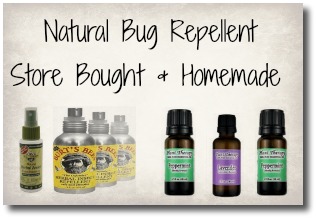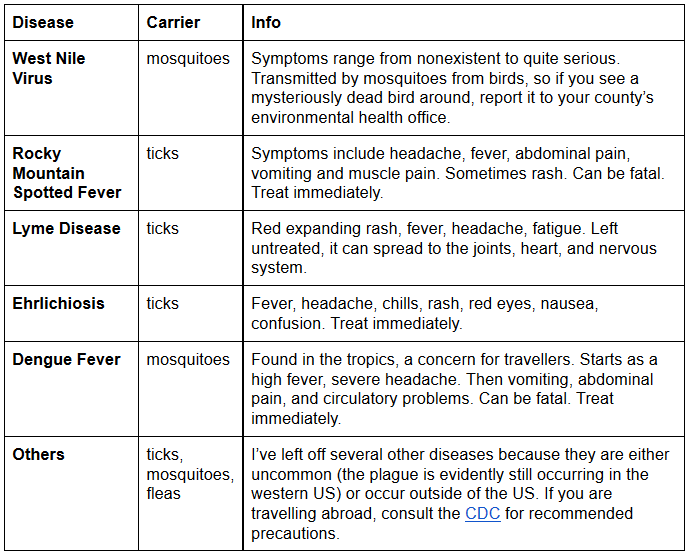This post may contain affiliate links. Read our disclosure here.
 The following is part of an Organic Living Journey Guest Post Series now written by Mariana who has a mother’s heart and scientist’s brain.
The following is part of an Organic Living Journey Guest Post Series now written by Mariana who has a mother’s heart and scientist’s brain.
This week, we’re talking about bugs and natural bug repellents to keep them from biting you! Summer is peak mosquito and tick season and there are tons of products on the market to help keep the bugs at bay. We’re going to talk about the health concerns of mosquito/tick bites, the types of bug repellents available, which ingredients to watch out for, and options for natural bug repellents you can pick up in the store or make at home.
Itchy, red bumps aside, insect bites can range from annoying to dangerous. If you’re bitten by a bug carrying a nasty disease, you could be in for quite a mess. So, let’s get informed about some common disease transmitted by mosquitoes and ticks. We’re researching diseases, so my first stop is the Centers for Disease Control (CDC) website. We’re not going to dwell on these hazards for too long, but here’s the quick and dirty…
The CDC recommends using insect repellent, specifically one containing DEET, to repel mosquitoes and ticks. We know the recommendations, now let’s take a look at these ingredients and see if there are any concerns and what healthy alternative are available.
Insect Repellents and Their Ingredients
I should start by telling you, I’m a mosquito magnet. I will get eaten alive just walking 30 feet to my mailbox. So, what attracts insects in the first place? Mosquitoes are attracted to moisture, warmth, carbon dioxide, odor, movement, and estrogen and other biological factors. These little vampires can detect you from over 160 feet away. Insect repellents work by creating a vapor layer around the skin with a scent that mosquitoes dislike. When properly applied, insect repellents act like a cloak of invisibility, hiding you from these bloodthirsty insects.
Everyone agrees that DEET is the most effective chemical to keep mosquitoes and ticks away, but is it safe?
The EPA says yes, no problem, totally safe.
…but shower after using it.
…and don’t put it on skin that isn’t exposed.
…only use just enough.
…don’t over apply.
…and don’t spray it on your face.
…don’t use it on cuts or irritated skin.
…and don’t put it on your kids’ hands.
…oh, and wash the clothes you wore too.
Um, why? Is it just me, or does this put up a red flag?
What is DEET? Short for N,N-diethyl-m-toluamide, it is a registered pesticide. It is a plasticizer that can damage or eat away at different plastics, rubbers, etc. DEET is absorbed through the skin and passes into the blood, but it’s overall toxicity is still in question. Research says it doesn’t cause any noticeable, adverse effects when used normally.
DEET is a neurotoxin in higher doses, and some research suggests it may have a hand in Gulf War Syndrome. In addition, there are significant reports of severe neurological reactions occurring in people after using DEET products, especially with contact through the eyes or mouth. Studies show that DEET can cause neurotoxicity in animals.
In 1995, New York state banned products with a 30%+ concentrations of DEET. Canada followed suit in 2004. There’s even a question of whether some mosquitoes are learning to avoid DEET altogether. For me, this is enough to make me question whether I should be using DEET at all. Personally, I try to avoid synthetic chemicals. Period. I err towards avoiding toxins, at any doses. If there are options for natural bug repellents, I’ll take it!
So, is there a more natural option than DEET? That’s still effective? Yes, and yes. Studies have shown that lemon eucalyptus oil (plant pictured below) is non-toxic and comparable in effectiveness to DEET. Score. It’s even registered as an effective insect repellent with the EPA. Bonus! Other oils are also very effective insect repellents (although there’s isn’t enough official research for the EPA to put its stamp of approval on them yet): citronella, clove, cinnamon, soybean, geranium (especially good for repelling ticks), lavender, lemongrass, and more.
Let’s Go Shopping
I keep insect repellent almost everywhere: my car, the front porch, the back porch, garage, and the pool bag. I’ve been shopping around lately, trying different natural bug repellents, and everything I’ve tried has actually worked really well! When you start shopping around for insect repellent, check ingredients, compare prices, and compare scents! Some natural insect repellents smell way better than others. Burt’s Bees Insect Repellent ($8) uses a blend of several different oils (soybean, citronella, rosemary oil, lemongrass oil, cedar oil, peppermint oil, and more). I bought it last summer and LOVED the smell. It worked wonderfully too. However, my husband has a very different opinion: he claims it smells so bad that he was embarrassed to use it. Last summer, I also bought All Terrain’s Herbal Armor spray ($9). We both liked the scent (citronella, peppermint oil, cedar oil, lemongrass oil, and geranium oil), and it really worked beautifully. A few weeks ago, I found EcoSMART Organic Insect repellent at Target for $3.50. I’m not in love with the scent (rosemary oil, cinnamon oil, lemongrass oil, geranium oil) or it’s alcohol base, but it’s not bad. For the price, it’s a winner in my book.
Want to whip up a batch at home? At about $0.10 – $0.30 per ounce, there are tons of essential oil based recipes you can try at home. The Daily Green gives two recipe options, one water-based and one oil-based. I found another interesting bug repellent recipe collection from Wellness Mama including the super-potent “Vinegar of the Four Thieves” insect repellent, supposedly used by thieves during the black plague. She also gives you a recipe for using fresh or dried herbs in place of oils, a great cost-cutting alternative for those with a prolific herb garden.
Personally, I LOVE the idea of blending my own essential oil insect repellent. I could customize the scents and ingredients (working around my soy allergy). However, the initial investment is high if you don’t already have a collection of essential oils on hand. I don’t. I keep the standard peppermint oil on hand, sometimes lavender and tea tree, but not enough variety to make a good insect repellent. For now, I’ll buy insect repellents in the store and plan on building my essential oil collection as I go.
Ticks
I think ticks deserve a special mention. The diseases they carry are very serious. Like mosquitoes, they are attracted to carbon dioxide, warmth, movement, and moisture. In addition, they are attracted to shadows and contrast. The CDC offers this advice: avoid, repel, and remove.
(1) When outdoors, walk along the center of trails and avoid wooded and bushy areas. Keep your arms and legs as covered as you can.
(2) Wear insect repellent.
(3) After coming inside, check your gear and clothing for ticks. You can put items in the dryer on high for 1 hour to kill any stowaways.
(4) Wash off in the shower within 2 hours of being outdoors.
(5) Do a thorough “tick check” of your body, checking the scalp, underarms, between the legs, along the waist, behind the knees…etc.
(6) Find something?! Here are the CDC’s instructions for removing a tick.
Soothing the Itch
Have you seen “My Big Fat Greek Wedding”? The Greek father used Windex medicinally for EVERYTHING. He’d use it to treat everything “from psoriasis to poison ivy”. In a similar fashion, my mother slathers Vicks VapoRub on EVERYTHING. I spent many childhood nights greased up in VapoRub to soothe mosquito bites, and I remember it working pretty well. I’ve seen products like Burt’s Bees Bug Bite Relief, but at $8/tiny bottle, I haven’t tried it yet. The active ingredient? Camphor and menthol. The same as Vicks Vaporub! Maybe my mom was on to something? Do you have a favorite itch-relieving tip?
Perspective
Insect bites are annoying, painful, and sometimes dangerous, so avoiding them is definitely in our best interest. There are very effective products to ward off bugs but some potential toxicity concerns too. If you’re in a seriously mosquito-infested area, use whatever you can get your hands on to protect yourself. If you have a more natural insect repellent available, opt for it! When the all-natural options are so readily available and effective, making the healthier choice is refreshingly easy.
Speaking of refreshing…next week we are starting our journey into bath products! Grab your loofa; we’re going to learn about shampoos, conditioners, body wash, and soap!



